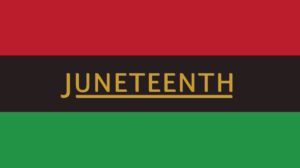Saturday is Juneteenth, a day that marks the end of slavery in Texas. June 19, 1865, was a momentous day.
Although President Lincoln signed the Emancipation Proclamation ending slavery in the Confederacy in 1863, many southerners sought to evade the executive order by moving enslaved people to Texas, the most Western of the slaveholding states. However, Union troops pursued them, arriving in Galveston in the summer of 1865 and finally freeing more than 250,000 Black Americans. Enslaved people were then formally emancipated, and slavery was officially abolished by the 13th Amendment in December of that year.
 Northwest Kidney Centers believes learning, reflecting and acting on this anniversary is important for many reasons, including the fact that Black and African Americans have a higher rate of kidney failure than any other group of people. They experience it at three times the rate of whites.
Northwest Kidney Centers believes learning, reflecting and acting on this anniversary is important for many reasons, including the fact that Black and African Americans have a higher rate of kidney failure than any other group of people. They experience it at three times the rate of whites.
Social determinants of health, race, and racism contribute to this reality, and systemic change is needed for outcomes to improve in a meaningful way. This Harvard Medical School blog post from February 2021 lays out the issue well.
Providing top-quality care for all and addressing health inequities are central to who we are. Values of teamwork, integrity, excellence, stewardship and respect infuse our work and inspire us to work toward inclusion.
May this day, and all the days that follow, bring improved understanding, empathy and equity.
